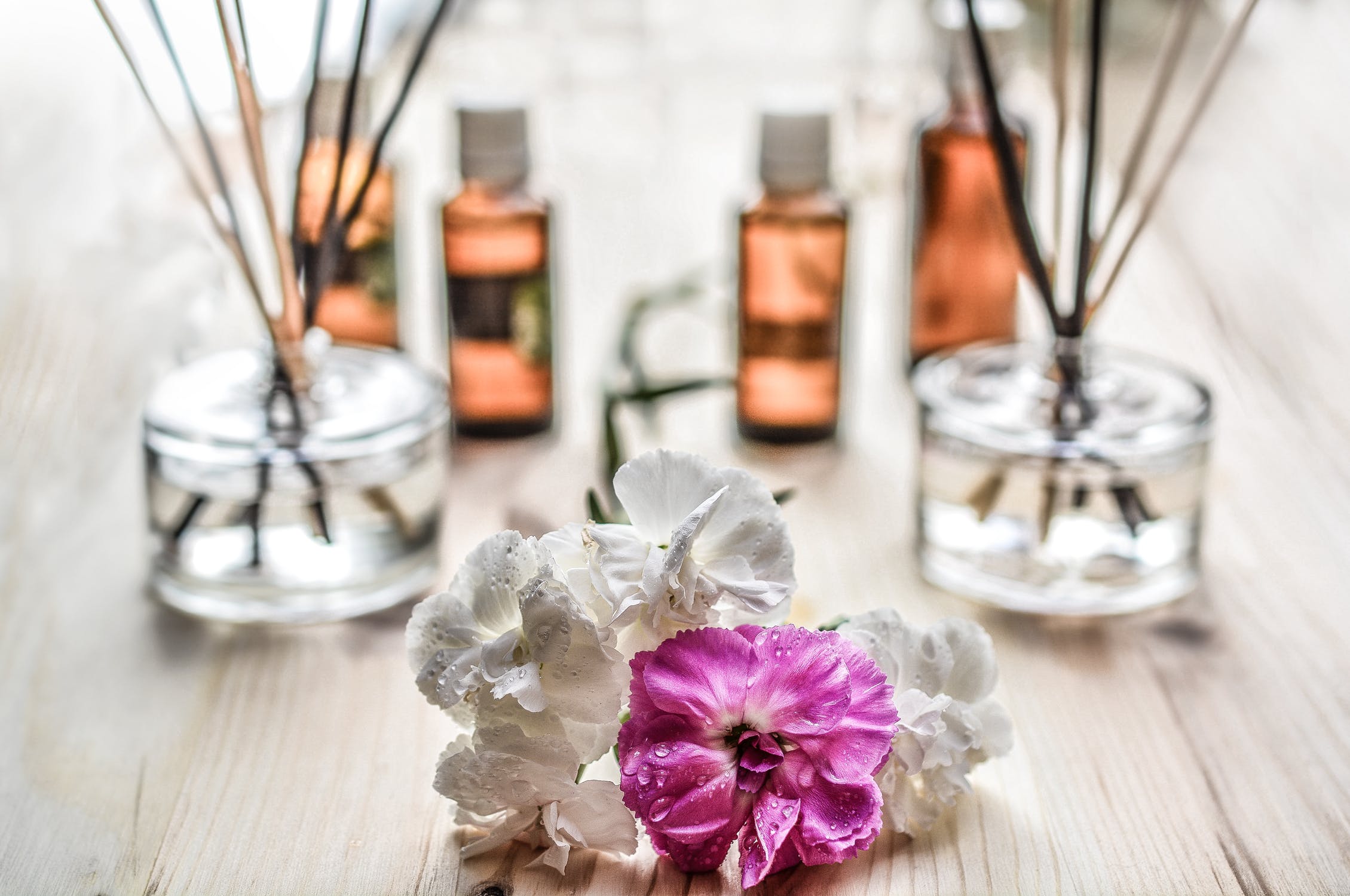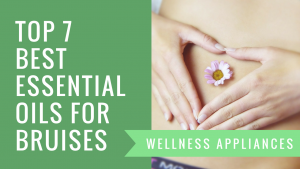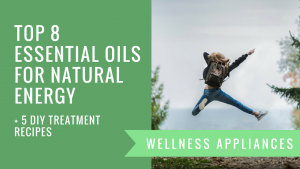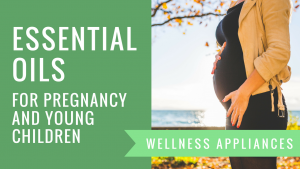Contents
- Aromatherapy Definition – What is Aromatherapy?
- Aromatherapy Essential Oils
- Best Aromatherapy Diffuser
- Aromatherapy Benefits
- Aromatherapy for Anxiety
- Aromatherapy Stress Relief
- Best Aromatherapy Oils
- Peppermint Aromatherapy
- Tea Tree Oil Aromatherapy
- Eucalyptus Aromatherapy
- Lavender Aromatherapy
- Aromatherapy Safety
Aromatherapy is a use of natural oils to address a certain problem or generally increase a feeling of wellbeing.
It’s use has grown in recent years as people become increasingly aware of natural methods to deal with certain conditions.
Aromatherapy Definition – What is Aromatherapy?
Aromatherapy is a type of alternative medicine that uses various plant-based oils with different scents to achieve certain effects to aid in well-being.
The use of these various scented oils is meant to be therapeutic and can have many different effects on the body depending on the scent of oil used.
Scented oils used in diffusers aren’t the only way to do aromatherapy. You can also use candles, massage oils, and other body products, just to name a few.
The official definition of Aromatherapy is:
Inhalation or bodily application (as by massage) of fragrant essential oils (as from flowers and fruits) for therapeutic purposes; broadly : the use of aroma to enhance a feeling of well-being –Merriam-Webster
Aromatherapy Essential Oils
Essential oils are used in aromatherapy to provide different benefits for individuals. The scent or type of essential oil used depends on the desired effect.
For example, lavender, which has a soothing effect, is the most common oil used. It is often used to relieve stress and to create a calming atmosphere.
For this reason, you might also notice lavender scented baby soap, lotion, or oil. The idea behind this is that the lavender scents will help soothe the baby, hopefully inducing a calming effect that will easy baby’s crying and help baby fall asleep.
Another common use for aromatherapy is to help lessen feelings of depression and anxiety. Since pharmaceutical antidepressants can have many undesirable side effects, turning to aromatherapy can be helpful.
Some essential oils that aid in lessening depressive feelings are lavender, jasmine, peppermint, and chamomile.
When selecting an essential oil for Aromatherapy, people generally try to look for oils marked, ‘Therapeutic Grade‘ because it means that oil is among the purest offered by the manufacturer.
Best Aromatherapy Diffuser
Many aromatherapy diffusers are available, so it’s important to do some research before choosing one. The Best Aromatherapy Diffusers are nebulizer diffusers because they break down and distribute the oils most cleanly and without any dilution from the water. We recommend the ArOmis Orbis Nox Merus diffuser.
This is a hand-blown glass nebulizer with a wood base that uses cold air to diffuse essential oils. This is a great alternative to plastic products that may contain chemicals and artificial materials that break down over time.
Since this product is made of glass and wood, you will be able to get years of use out of it as long as you maintain it with proper care. Another great feature of this product is its built-in timer that allows it to cycle on and off every ten minutes, shutting off after sixty minutes, or the option to have it automatically turn off after four hours.
This means you can turn it on, let it go, and not have to worry about whether or not you remembered to turn it off before leaving the house.
Aromatherapy Benefits
Today, essentials oils are used for a plethora of things like reducing depression and anxiety, increasing energy, inhibiting hair loss, improving short-term memory, and relieving chronic itching from the skin conditions like eczema. (as well as a host of non-medical uses such as for cleaning and use with pets).
The use of aromatherapy has seemingly skyrocketed in popularity in recent years, most likely due to the fact that aromatherapy offers a natural method of achieving desired results.
Aromatherapy has a myriad of health benefits depending on the type of essential oil used. Some of those health benefits include relief of depression or anxiety, a stronger immune system, higher energy levels, relief of headache or pain, or improved sleep, just to name a few.
Aromatherapy for Anxiety
Various essential oils are available to ease anxiety and stress. Many compounds in the aromas of essential oils can help relax and soothe the body and mind, easing stress and lowering anxiety levels.
Some of the best oils for this include lavender (bet you didn’t see that coming), peppermint, lemon, bergamot, vetiver, and ylang-ylang. Lemon oil, in particular, has also been shown to reduce anger and improve mood.
Aromatherapy Stress Relief
Aromatherapy has been shown to change brain waves and behavior, reduce stress by decreasing levels of cortisol and decreasing feelings of depression, and increasing feelings of calmness and relaxation.
Aromatherapy can be done in several ways, such as candles, massages and massage oils, lotions and other body products, and diffusers.
Best Aromatherapy Oils
If you haven’t guessed it already, lavender is the most frequently mentioned essential oil, most likely because of its numerous benefits for a person’s well-being.
Chamomile is another great oil because it provides calming benefits, as well as works as an anti-inflammatory. Likewise, clove is a great oil because it has antioxidant, antifungal, and antibacterial properties. It can also aid in pain relief for things like toothaches, headaches, nausea, or indigestion.
Ginger is another great oil that can help with nausea, indigestion, and other stomach discomforts, as well as giving a boost to metabolism.
Peppermint is great for relieving pains, particularly headaches and muscle pains. Like ginger, it also acts as a great stimulant.
Lemon is another great scent for helping you feel energized, but it is also the smell of all things clean, especially if you’re used to lemon-scented cleaning products, so lemon brings with it the scent of cleanliness and calmness.
Eucalyptus is a scent that can soothe your body when you’re sick since it has many properties similar to clove, and it also can help clear sinuses and congestion.
Peppermint Aromatherapy
Peppermint, the use of which dates back to ancient times, has many uplifting and healing properties. Its scent can help ease headache pain, as well as stimulate the senses and the body and mind.
In a diffuser, peppermint can create an energetic atmosphere. If you have a headache, try using a roll-on peppermint oil and applying a dab of it to the temples.
Tea Tree Oil Aromatherapy
Tea tree oil is extracted from the twigs and leaves of the tea tree, native to parts of Australia, but due to the increasing popularity of tea tree oil, the tea tree can now be found all over the world.
Tea tree oil can be used in aromatherapy as a stimulant, but the actual application of the oil on the skin has numerous beneficial effects, such as speeding up healing due to its antimicrobial, antibacterial, antifungal, and antiviral capabilities; helping take care of hair and skin and reducing acne, and acting as an expectorant.
Eucalyptus Aromatherapy
Eucalyptus is another diverse essential oil. It provides many of health benefits similar to those that tea tree oil provides, such as clearing sinus and chest congestion, boosting the immune system and speeding up the healing process, acting as an anti-inflammatory, and easing muscle pain.
Lavender Aromatherapy
Lavender is a great option for aromatherapy because it offers many benefits, such as improving mood and relieving some of the feelings of depression or anxiety, aiding in feelings of calmness and relaxation, helping induce sleep, and helping relieve stomach discomfort, just to name a few.
Aromatherapy Safety
1. Never use undiluted essential oils on your skin. Mix with a carrier oil. Try a test area to see if your skin burns. See more in our article on how to use essential oils safely
2. Specific essential oils can cause allergic reactions or sensitization that can last forever. Use a skin patch test when using an oil for the first time.
- Skin Patch Test—On the inside of your elbow put 1-2 drops of diluted essential oil—be sure the oil is diluted—never put pure oil on the skin. Do not use oils that have irritated you before. Put a Band-Aid on it and keep it dry. If you feel any itching or irritation, remove the Band-Aid and wash the spot with a gentle soap and water then rinse.
- If you have no problems, let it stay on for 24 hours. This means the diluted oil is safe to use on your skin. If you are allergic to the plant it came from, its essential oil will give you sensitivities, and you should not use it.
3. Essential oils can cause inflammation, blistering, irritation and can make you be sensitive to the sun. Learn more about essential oils phototoxicity.
4. Pregnant and breastfeeding women should not use specific essential oils. Those suffering from epilepsy and asthma should not use some oils. Read and research safeguards with the oils you plan to use.
5. Use the smallest amount of essential oils. You don’t need to use more. More is not better. When the instructions tell you to use 3-4 drops then use that amount.
6. Certain essential oils are not safe for aromatherapy. Some are: bitter almond, camphor, horseradish, onion, pennyroyal, rue, sassafras, wintergreen, and wormwood. Only an aromatherapist would know about these and probably wouldn’t use them.
7. Keep essential oils away from kids. Some smell good enough to eat to little ones. They can cause serious injuries to kids, so hide your oils away somewhere under lock and key.
8. Some essential oils, such as the citrus and spices must not be ingested unless you know what you are doing. Check with a qualified aromatherapist for knowledge or read a good book.
9. Be sure to keep away from flammable sources since essential oils can combust easily.
10. Age is a factor to be considered with young children and the elderly. Skin is sensitive and dilution should be used for these people. The dilution of the potent oils will need to be taken into account. Consult a qualified aromatherapy practitioner.
We wish you much success with using essential oils and diffusers. They both indeed benefit life with delightful fragrances.
Read more at The National Association for Holistic Aromatherapy.




